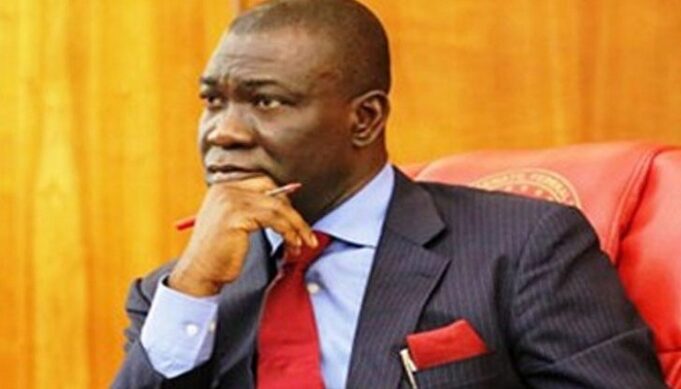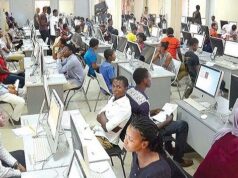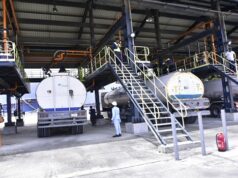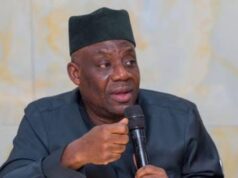A Federal High Court sitting in Abuja, on Friday, set aside the November 4, 2022, interim forfeiture order on 40 landed property linked to former Deputy Senate President, Ike Ekweremadu, and his wife, Beatrice.
Justice Inyang Ekwo, in a ruling, said he discovered that the application for forfeiture filed by the Economic and Financial Crimes Commission (EFCC) was not brought in good faith and ought to be struck out.
Justice Ekwo held that the EFCC failed to disclose material facts out the matter.
He said though the anti-graft agency knew the predicament of Ekweremadu and his wife in the United Kingdom (UK) and did not deny writing a letter to the Crown Prosecution Service in the UK to furnish them with information about the lawmaker, the EFCC still brought an application seeking an order for them to show cause on the assets to be forfeited.
“I do not think that the desired objective of the legislature in enacting the provision of Section 17 of the Advance Fee Fraud and Other Related Offences Act (AFFOROA), 2006 relied upon by the respondent (EFCC) in initiating the proceeding to obtain an ex-parte order of interim forfeiture order was for the provision to be used in any circumstance where the person affected is not in a position to defend himself or show cause as required,” the judge said.
Justice Ekwo stated that despite the fact that the ex-parte order in the case was obtained subject to the provision of Section 17 of the AFFROA 2006, the validity of the order and indeed the entire proceeding leading to the order would be affected by non-disclosure, suppression or misrepresentation of material facts.
The judge also disagreed with the EFCC that since the Ekweremadus had failed to filed application to show cause, the court should go ahead with the order for final forfeiture of the assets.
READ ALSO: Ekweremadu to spend Christmas in prison as London court declines bail
“I do not think that this position is correct. The requirement to file affidavit to show cause pursuant to S. 17 of the AFFOROA, 2006 will hold strong in a normal situation where the person required to do so is not fettered by any act, condition or situation that amounts to a deprivation of the right to show cause as required by law.
“In this case, the respondent (EFCC) wrote Exhibit SIE 2 (a letter) to the Crown Prosecution Service in the United Kingdom which letter was used as evidence to deny Senator Ike Ekweremadu bail in the criminal proceedings.
“At the same time, the respondent filed ex-parte application for interim forfeiture which upon order being made thereon required Senator Ike Ekweremadu and his wife to show cause in Nigeria why an order for final forfeiture ought not to be made.
“I have been asking myself the question repeatedly. How can a citizen of Nigeria who is incarcerated outside the country to the knowledge of the respondent, be expected to show cause in an action in Nigeria brought by the respondent?
“In other words, how do you help to tie down a man and initiate a fight and demand that the same man you have helped to tie down must defend himself?
“This in my opinion, is an unconscionable act. The act of the respondent clearly shows that this action was brought in bad faith.
“In law, bad faith entails dishonesty of belief or purpose.
“On the whole, I find that the application for forfeiture, going by the facts of this case has not been brought in good faith and ought to be struck out,” Justice Ekwo said.
He held that Ekweremadu’s son, Lloyd, had done the right thing by bringing an application to set aside the proceedings initiated in bad faith and suppression of material facts.
“Once more, this court needs to apply the test of reasonableness of the act of the respondent in initiating the proceeding leading to the interim forfeiture order.
“I have done so and found this applicant ex-parte wanting in that respect.
“Consequently, I make the following orders:
“An order is hereby made setting aside the interim forfeiture order of the properties of Senator Ike Ekweremadu and his companies made by this court on 4th day of November, 2022, upon the ex-parte Originating Motion filed by the Economic and Finance Crimes Commission (EFCC) on 27 July, 2022.
”The entire proceeding initiated by the respondent is hereby set aside,” Justice Ekwo declared.
Justice Ekwo had, on November 4, 2022, granted the anti-graft agency’s ex-parte motion, seeking an interim order of forfeiture of some property of Ekweremadu.
READ ALSO: Ekweremadu loses 40 U.S., UK, Dubai, Abuja, Lagos, Enugu properties to FG
The judge had ordered the agency to publish the interim forfeiture order of the property in a national daily within seven days.
He directed anybody who had interest in the forfeited property to indicate within 14 days of the publication on why the property should not be permanently forfeited to the Federal Government.
Ekweremadu’s oldest child, Lloyd, the Anambra State Government, and a company, Uni-medical Healthcare Limited, on December 5, appeared in court as parties interested in the seized property.
Lloyd, in a motion on notice marked: FHC/ABJ/CS/1242/2022 and filed by Chief Awomolo, prayed the court for an order setting aside the Interim forfeiture order on his father’s property and companies.
Lloyd, in a four-ground argument, said the facts in support of the the EFCC’s ex-parte originating motion “deliberately and fraudulently omitted very critical facts/evidence, which negate the granting of the application.”
He argued that the motion which the anti-graft agency commenced the action was filed in absolute bad faith.
Ekweremadu, who is currently in detention in London, and his wife, are facing a charge bordering on alleged organ harvesting against David Ukpo, said to be an underage.
- VIDEO: JAMB candidates stranded in UTME mock exam room for hours - April 10, 2025
- Dangote refinery reduces petrol price to N865/litre - April 10, 2025
- FG orders tertiary institutions to advertise job vacancies - April 10, 2025








